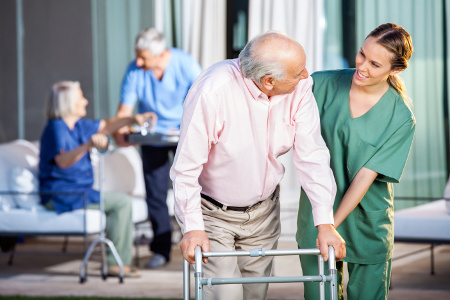 Stroke Care Plan: for survivor and caregiver
Stroke Care Plan: for survivor and caregiver
If you are caring for a stroke patient, you may have a lot of questions about whether your loved one will recover and what his or her needs will be in the months and years ahead. You may also ask about how you will manage your new role.
Despite the challenges of caregiving, many people report that they appreciate life more and feel positive about being able to help.
As a caregiver, it can be all too easy to make your loved one the focus of your life but it’s vital to ask for help. You can’t do it alone. Here are some suggestions that can help you balance the needs of the stroke patient with your own health and happiness.
 Stroke Care Plan: caring for the survivor
Stroke Care Plan: caring for the survivor
Learn and assess
There can be a lot to learn, so take advantage of every opportunity to learn about stroke and your loved one’s condition and prognosis. Talk with the health care team about what the stroke recovery and rehabilitation process looks like, and ask them for any bit of information they have. Also ask them if you can call or visit them in the future for follow-up enquiries.
Join support groups or programs that are offered by the hospital – these can be the best source for of information and support, because you are connecting with people who are in your situation.
Browse the internet and read more about stroke, taking information from reliable sources such as the Canadian Heart and Stroke Foundation and The Mayo Clinic.
Participate in stroke rehabilitation.
Attend a few rehabilitation sessions so that you can support your loved one during their recovery. You can get instruction from the rehabilitation specialists to see what you can do at home.
Encourage your loved one to practice new skills, but don’t always jump in to help. Be supportive, and allow survivors to do things for themselves. This will help them to be more confident and independent, and doing more for themselves will help the caregiver in the end.
Assess your stroke survivor needs as well as your ability to meet them
The stroke survivor may need the following:
- Personal care such as bathing and dressing (depending on what type of stroke experienced)
- Coordination of their health care needs including medications and doctor and rehab appointments
- help the survivor maintain and increase his or her ability to function
Remember that you can’t do everything. Try to be realistic with yourself about what you can take on and what you may need help with. If personal care is needed, call the Client Care Access Centre (CCAC) nearest you to get an assessment for government funded homecare. As a senior home care company in Toronto, we work with CCAC and supplement their care so that stroke survivors can get the care they need.
Coming Home after a Stroke
There are some issues should be considered before arriving home:
Consider safety
Get an occupational therapist assessment to determine if you need to do anything to make the home safer. You may need to move the bedroom to another floor to avoid stairs, remove rugs to prevent falls, or install grab bars and seats in the bathroom and shower.
Get ready for behavior or mood changes
The losses from stroke, whether temporary or permanent, can be devastating to the survivor. There are a lot changes in behavior or mood swings could happen to your loves ones.
Stroke survivors are at risk for depression — from 30% to 50% are affected , if you start to see signs of depression ask your doctor immediately for help.
Be aware of the risk factors for a second stroke
Always remember that your loved one who had a stroke is at a higher risk for a second stroke, so it’s important to help minimize that risk. Be sure your loved one takes medications as prescribed and keeps doctor appointments.
 Stroke Care Plan: Taking Care of Yourself
Stroke Care Plan: Taking Care of Yourself
The more you care for yourself, the better you can care for your loved one. Exhausting yourself won’t allow you to provide the patient, loving help you want to give. It’s not selfish to take time for your needs — it’s essential, and beneficial, for both of you. You need respite, and don’t wait until you get permission from someone else to get it. Other people do not know the responsibilities that you have and the situation you are in. You need to take care of yourself as well as your loved one.
Remember that you have a right to your own time and activities
Plan time apart and recharge your batteries by having respite care that allows you to participate in your own activities.
Focus on your physical health
Learn healthy ways to manage stress and relax. Eating a healthy diet, exercising regularly, and getting enough sleep will help you keep up your strength.
Focus on your emotional health
Allow yourself to feel frustrated, angry, and sad, and share it with someone other than your loved one. These feelings are normal, and in order to not dwell on them, you need to express them. This is where friends and support groups can play an important role.
Studies show that caregivers are also at risk for depression, especially if the survivor has dementia. Depression responds well to treatment, so talk with your doctor if you think you may be depressed.
Get Support
Hiring a home care company to help care for your loved one will bring in a partner in care to help you both.


 Stroke Care Plan: for survivor and caregiver
Stroke Care Plan: for survivor and caregiver



